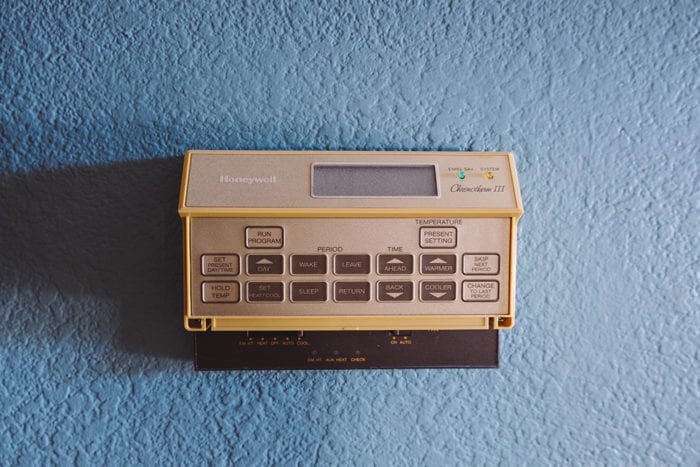HVAC Maintenance: What It Is and Why You Need It
Read on for all you need to know about the what and why behind HVAC maintenance.
HVAC stands for Heating, Ventilation, and Air Conditioning and is the system most responsible for helping maintain comfortable temperatures in your home and providing high air quality.
As a homeowner, it’s incredibly important to oversee the seamless function and maintenance of your HVAC system in order to keep utility costs low, maintain normal temperatures, provide healthy air quality to family and friends, and ensure solid home equity when it comes time to sell.
That’s why here at Homesense Heating and Cooling, we encourage clients to regularly take part in preventative maintenance to protect their system from problems down the road. This includes easy and straightforward care by the homeowners, as well as preventative maintenance plans offered by our team. Below, we outline the homeowner checklist and what we offer when servicing HVAC systems.
Quicklinks:
- HVAC Homeowner Preventative Maintenance Checklist
- What to Expect to be Included in HVAC Maintenance
- Why You Need HVAC Maintenance
- What Does an HVAC System Usually Cost?
- How Often Do You Need HVAC Maintenance?
- Signs You May Need to Replace Your HVAC System
- Standard Air Conditioning Maintenance
- Standard Heating Maintenance
- Other HVAC Options
HVAC Homeowner Preventative Maintenance Checklist
All homeowners should take the time to perform standard HVAC maintenance tasks each year in order to keep their system functioning well. Here are the following items we include in the homeowners checklist:
- Purchase high-efficiency air filters so that you’re prepared to swap them out with current filters.
- Replace air filters every 90 days.
- Keep the area around the HVAC system clear so that nothing prevents air from coming in or going out.
- Once a month, inspect the AC refrigerant lines for leaks.
- In the summer, turn off water to the furnace humidifier.
- In the fall, replace the humidifier filter and turn water back on.
- Replace carbon monoxide/fire alarm batteries annually.
- Once a year have the HVAC motor lubricated and inspected.
- Consider cleaning the AC condensation drain line once a year.
If these steps are followed correctly and maintenance is performed when needed, your system should last longer — closer to 25 years.
What Consumers Should Expect to be Included in HVAC Maintenance
Even though homeowners can handle standard HVAC maintenance tasks, an HVAC system is complex, and some issues might not be obvious. Professional checks need to be done occasionally to check things like electrical components and ductwork.
We encourage you to sign up for a Homesense Comfort Plan that will ensure all items are reviewed and checked off. Here’s what you can typically expect:
- Check thermostat
- Check filter
- Inspect heat exchanger for cracks
- Check and clean outdoor coil
- Check for temperature rise
- Check for temperature drop
- Check fan control
- Check and adjust air flow
- Check furnace safety controls
- Check electrical connections
- Check for gas leaks
- Check amp and volt draw on motors
- Check and clean burners
- Check condenser drain
- Check ignition system
- Check all capacitors
- Inspect for refrigerant leaks
- Check gas valve operation and pressure
- Check contactor and electrical controls
- Check compressor terminals
- Check backup heat elements
- Check disconnect power box
- Check sequencer operation
- Inspect evaporator coil when accessible
- Test cycle for proper operation
- Check breaker and SSU
- Check reversing valve operation
- Check defrost control
- Provide repair recommendations
Why Do You Need HVAC Maintenance?
Common HVAC Problems
While there are many possibilities for things that could go wrong at home, here are some of the most common problems homeowners can expect to see when it comes to their HVAC system.
- Not Enough Maintenance: Your HVAC system is one of the most important parts of your home, so be sure to take care of it. It should be checked on a regular basis as this not only helps you avoid problems.
- Dirt and Debris: All components of your HVAC system need to be free of debris. It can not only cause your system to work inefficiently, but also reduce air quality and flow due to problems with things like dirty air filters or leaves in the fan.
- Corrosion: Where wiring and moisture exist, there you’ll find the possibility for corrosion. This will generally cause your heating or cooling system to turn on and off on its own and force your system to work harder. With this strain, your system could gradually break down.
- Leaks: HVAC connector and drain lines have the ability to develop leaks that can make your system run harder than it should and can ultimately lead to needing replacement parts or an entire new unit altogether.
- Uneven Room Temperatures: Not all rooms are the same and some require a lot more heat during the winter months to reach the same temperature as all the other rooms. If you’ve been noticing that several rooms in your house are cooler than others, you may have a problem.
- Ignition Issues: Sometimes it takes a bit for your system to light and get going. There could be a few reasons for this happening like running low on gas, short cycling, or a part that needs replacement.
- Broken Thermostat: Your thermostat is what tells the system when to get hot or get cold. However, if it’s not functioning properly, your whole system might seem out of whack. Pieces in the thermostat may need to be replaced or cleaned to get things moving again.
- Odd Furnace or AC Noises: Nothing is more disturbing than a machine making loud, weird noises. This can be a key sign that something is wrong with the mechanics. You may need to replace the motor or review the pieces inside that make it run.
The 6 Most Important Reasons to Have HVAC Maintenance
While there are multiple reasons to practice preventative HVAC maintenance, here are the top six we find to be the most compelling when working with you, our client.
- High-Efficiency System Performance: When you have a technician check your system, you are ensuring that it’s going to run at its highest efficiency. Our technicians can identify and fix problems before they affect the system, keeping it running smoothly. The results of an effective HVAC system help you save money on energy bills and give you better temperature control for your home.
- Reduced High-Cost System Breakdowns: By scheduling preventative maintenance, you reduce your risk of a higher-cost breakdown down the road. These checks are essential in catching problems before they fully develop. Regular HVAC maintenance is said to reduce the risk of costly breakdowns by as much as 95 percent.
- Reduced Cost on Utility Bills: Systems that aren’t functioning as they should will often cause your system to run harder and longer, thus running your bills sky-high. By running regular checks, you ensure heat and cool air aren’t costing you a fortune.
- Improved Air Quality: Efficient HVAC units not only help your home’s temperature control, but also prevent problems with air quality. Regularly replacing and cleaning the filters and coils of your system cause air quality throughout your home to stay fresh. Considering 90 percent of our adult lives are spent indoors — your home’s indoor air quality matters.
- Prevent Safety Issues: HVAC maintenance helps safeguard you and your family against a variety of potential risks from developing. Regular maintenance reduces your risk of carbon monoxide exposure and fire hazards that could cause serious injury when not checked.
- Longer and More Comfortable Life: Keeping your HVAC unit functioning as it was designed is important for each individual that enters your home and for the system itself. A high-efficiency HVAC unit keeps people’s airways clear, their bodies comfortable, and your system from breaking down.
Benefits of HVAC Maintenance
There are many benefits to regular HVAC maintenance. Here are some of the biggest benefits our clients experience:
- Keep warranties intact.
- Provide a comprehensive inspection.
- Clean, test and lubricate necessary parts.
- Uncover signs of excess wear and tear, avoiding potential HVAC repairs or breakdowns.
- Help your air conditioner or heat pump run as efficiently as possible.
- Extend the lifespan of your air conditioning equipment.
What Does an HVAC System Usually Cost?
What Does a New Furnace Cost?
On average, furnace installation ranges between $2,500 – $6,000 nationwide. Many factors affect the cost of a new furnace, making it difficult to determine a set, one-size-fits-all price. Here are several items to consider in order to make an educated decision when buying a new furnace:
Cost Factors:
- Energy Source: When it comes to energy, it’s important to understand how your furnace is fueled. Most furnaces are gas-fueled, with a cost range from $2,000 – $5,000. Alternatively, some furnace systems are powered by electricity, which typically range in cost from $5,000 – $15,000. Both of these costs will range due to size and efficiency.
- Furnace Efficiency: An annual fuel unit efficiency (AFUE) rating indicates the efficiency level of a furnace. The higher the rating, the more efficient (and more expensive) your furnace costs. Standard efficiency systems are rated at 80%, meaning 20% of the generated heat gets lost. Newer models typically receive a 90% rating or higher, with some reaching 98.5%. While these models may cost more upfront, they ultimately result in lower utility costs.
- Furnace Size: In gas furnaces, heat output gets measured in British Thermal Units (BTUs). Single gas furnaces usually start at 40,000 BTUs and can increase to 135,000 BTUs. If your home exceeds 5,000 square feet, we recommend moving to a two system unit, instead of upgrading to the largest system.
- Installation: Installation typically takes a team of two technicians an entire day with the cost of labor usually making up about half of the overall price. Furnace installation costs typically depend on the following:
- Brand: Our technicians give you several top-rated recommendations to consider for your specific needs and requirements that are both reputable and budget-friendly.
- Furnace Location: If your furnace sits in a difficult-to-reach spot in your home, the installation may take longer and require more technicians, which will increase your cost.
- Choice of HVAC Contractor: We strongly recommend doing your research when looking for an HVAC contractor for a new furnace installation. Ensure you receive a warranty in writing from your HVAC contractor that specifies the covered heating equipment, the length of coverage, and the process to resolve problems.
How to Make Buying a Furnace Less Expensive
The following tips can help make the cost more manageable:
- Consider Costs to Operate: We recommend investing in a high-efficiency, Energy Star-labeled furnace to save you money in the long-run.
- Finance Options: Ask about low monthly payments and no interest periods when buying a new furnace. Home equity loans, home improvement loans, or reward credit cards can also make the initial expense of a new furnace more manageable.
- Maintain Your Furnace: Change your filters regularly, and schedule a yearly furnace maintenance check from your HVAC contractors. Don’t put off needed furnace repair and replacement services as this could result in costly repairs.
- Control Your Thermostat Remotely: New thermostats allow you to set back your thermostat when you’re away via phone app settings. This helps lower utility bills, especially if weather shifts unexpectedly.
- Take Advantage of Rebates: Most utility companies, manufacturers, and dealers offer some type of rebate or discount when you upgrade to a new or more efficient furnace.
What Does a New AC Cost?
On average, AC installation ranges between $3,000 – $8,000 nationwide. Many factors affect the cost of a new AC unit, making it difficult to determine a set one-size-fits-all price. Here are several items to consider in order to make an educated decision when buying a new AC unit:
Cost Factors:
- Energy Source: When it comes to energy, it’s important to understand how your AC unit is fueled. Most AC units are electric and use a heat pump-air handler combination system. It’s common for a central air conditioning system to use 3,500 watts and — when paired with the average national kWh cost (13.2 cents) and running the unit for eight hours per day — the setup will cost you about $3.70 per day. Per month, that comes out to $110.88.
- AC Unit Ratings: An important factor of HVAC systems is the Seasonal Energy Efficiency Ratio (SEER). The Air Conditioning, Heating, and Refrigeration Institute (AHRI) uses the SEER to rate the efficiency of air conditioning systems. The higher the SEER rating, the more energy-efficient the unit. However, systems which offer higher energy saving and operation efficiency are typically less expensive to operate. The added cost of the HVAC equipment is paid through lower monthly electricity bills. AC units have a SEER rating which ranges from at least 13 to more than 28.
- AC Unit Size: When it comes to choosing the size of your system, bigger may not always be better. Smaller units with too small of a cooling capacity may constantly run, resulting in poor cooling and increased cost of utilities. Oversized units with too large a cooling capacity may too quickly cool the interiors, resulting in the removal of indoor humidity and poor function and wear-and-tear of the unit, which may lead to system breakdowns.
- Installation: Installation typically takes a team of two technicians an entire day with the cost of labor usually making up about half of the overall price. AC installation costs typically depend on the following:
- Brand: Our technicians give you several top-rated recommendations to consider for your specific needs and requirements that are both reputable and budget-friendly.
- AC Location: If your AC unit sits in a difficult-to-reach spot around your home, the installation may take longer and require more technicians, which will increase your cost.
- Choice of HVAC Contractor: We strongly recommend doing your research when looking for an HVAC contractor for a new AC installation. Ensure you receive a warranty in writing from your HVAC contractor that specifies the covered equipment, the length of coverage, and the process to resolve problems.
How to Make Buying an AC Unit Less Expensive
The following tips can help make the cost more manageable:
- Consider Costs to Operate: We recommend investing in high-efficiency, Energy Star-labeled AC units to save you money in the long-run.
- Finance Options: Ask about low monthly payments and no interest periods when buying a new AC unit. Home equity loans, home improvement loans, or reward credit cards can also make the initial expense of a new AC unit more manageable.
- Maintain Your AC Unit: Change your filters regularly and schedule a yearly AC check from your HVAC contractors. Don’t put off needed repair and replacement services, as this could result in costly repairs.
- Control Your Thermostat Remotely: New thermostats allow you to set back your thermostat when you’re away via phone app settings. This helps lower utility bills, especially if weather shifts unexpectedly.
- Take Advantage of Rebates: Most utility companies, manufacturers, and dealers offer some type of rebate or discount when you upgrade to a new or more efficient AC unit.
How Often Do You Need HVAC Maintenance?
At Homesense, we strongly believe in prevention. While your system still functions properly, we recommend that you commit to regular maintenance to prolong the life of your HVAC system. Three key maintenance checks to add to your calendar include:
- Change your filter regularly (every 1-3 months).
- Keep your outside unit clean and clear from debris.
- Schedule professional inspections at least twice a year.
Signs You May Need to Replace Your HVAC System
Unfortunately, HVAC systems don’t last forever. If your furnace or AC stops working, a Homesense technician conducts a thorough 19-point inspection of your system and determines the issue and all viable solutions. Here are some of the things to watch for in a faulty HVAC system:
- Older System Age: The average lifespan of an HVAC system ranges from 16 to 20 years. Once you know the age and when it was installed, it’s easier to understand where it is in its lifecycle.
- Low AFUE Rating of Your Furnace: AFUE stands for Annual Fuel Utilization Efficiency and refers to how well your system converts energy from its fuel into heat. For example, an AFUE of 90% means 90% of the energy in the fuel becomes heat for the home. The other 10% escapes up the flue and outside. The typical minimum is 80 percent AFUE. Some models, however, may achieve up to 98.5 AFUE.If you cannot find your AFUE rating on your furnace, you can call your furnace manufacturer or google the model.
- High Energy Bills: While it’s normal to spend more on utilities when you’re trying to cool your home in the summer, your bill shouldn’t be significantly higher than it was in the same month last year. If your energy bill increases more quickly, it may be an indication that your system isn’t working correctly.
- Uneven Temperatures in the House: Why is the bedroom freezing and the living room incredibly warm? Why can’t your HVAC system maintain a consistent temperature throughout your entire home? If a system is too big for the home, it can start short cycling. This is when the temperature is satisfied in the house too quickly and causes the system to turn off. It can also be due to faulty ductwork not carrying the air where it needs to go.
- Constant Running Inside the Home: In the summer, your AC might kick into high-gear to keep your home comfortable. However, if an air conditioner won’t turn off on a normal day, it might need some attention. It’s a possible indicator that the air conditioner doesn’t have the capacity it used to have. It could be affected by dirt or debris that needs to be removed or it could mean that the compressor isn’t working like it should.
Standard Air Conditioning Maintenance
AC Repair Services
When you realize the air isn’t working, there’s no time to delay. You can trust Homesense in Indianapolis with your air conditioning repairs. We repair all makes and models of cooling equipment, air conditioners, heat pumps and ductless units.
Our experienced and certified HVAC technicians are not incentivized to sell. Their goal is to restore your air conditioning cost-effectively and quickly.
What to Check on Your AC Before Calling Homesense
We suggest checking the following to see if you can make any of your own home AC repairs:
- Breaker or Fuse: If your AC doesn’t turn on at all, it could mean that you’ve blown a circuit breaker or fuse. Make sure your AC is receiving power from your electrical panel. Second, reset the circuit breaker. Third, replace your fuse.
- Thermostat Setting: You may experience issues with an improperly set or faulty thermostat. Check the settings to make sure the thermostat reads “cool” when you want the A/C turned on, instead of “off” or “heat.”
- Condensation Sensor: There’s a sensor on your condensation tray that will turn your A/C unit off when there is an overflow of water being collected. Check this tray to see if it is full, and if so, empty it and see if your unit turns back on.
- Blower Door on Air Handler: Check your air handler to make sure the blower door is securely closed. Otherwise, your A/C unit will not turn on.
- Blocked Condenser: Check to see if your condenser is blocked by weeds, grass or other airborne debris. If it is, remove the blockage and clean the condenser.
- Change Filter: Pull out your air filter to see if it needs to be replaced. We strongly recommend cleaning or changing your filters at least four times a year (when the seasons change) or, better yet, once a month.
- Register Dampers: If your A/C is turned on but not cooling the air, check your register dampers on the vents in each room to make sure they are set to the open
What to Expect on AC Maintenance from Homesense
While many HVAC companies focus on profit, we incentivize our technicians to repair existing equipment instead of trying to sell new equipment for no reason. Our goal is to fix your air conditioner properly so you can avoid issues in the future. When you call Homesense Heating and Cooling for a repair in the Indianapolis area, you can expect friendly customer service. At the end of our inspection, you’ll:
- Receive a thorough HVAC system diagnosis.
- Receive an easy-to-follow estimate.
- Receive honest answers to your questions.
- Receive timely and high-quality technical advice.
- Never be forced into making a decision with high-pressure sales tactics.
- Be presented with a variety of equipment options. You’ll truly get genuine advice on what is best for your situation—not just a push for the highest-priced item.
- Receive professional installation of your chosen equipment by a technician with experience and integrity.
AC Replacement Guide
If it is time for your air conditioning system to be replaced, here are some tips when shopping for a new unit.
Comparing A/C vs Heat Pump
While a heat pump looks exactly like an outdoor A/C condenser, the difference lies in the fact that both heating and cooling occur within the heat pump. On the other hand, an A/C condenser works with a split system, where cooling happens within the outdoor unit and heating takes place within the indoor furnace.
When to Replace Both A/C and Furnace
In some situations, it can make the most sense for you as a homeowner to replace both your air conditioner and furnace at the same time, but not always. Here are few tips on when and when it may not be in your best interest to replace your entire HVAC system:
3 Reasons You Shouldn’t Replace:
- Your furnace is less than 10 years old and has no issues.
- You don’t have the money to responsibly replace it now, or you have other large financial priorities at the moment.
- You are planning on moving within the next year.
4 Reasons to Replace:
- Your furnace is more than 10 years old and has had some issues.
- Resources are available to replace them both now.
- Your home has a downflow furnace, which means your existing furnace has to be completely removed in order to replace your air conditioner.
- You want a high-efficiency air conditioner, in which case you are required to also replace your furnace with a high-efficiency option.
How to Shop for the Best Air Conditioning Repair Services Provider
Shopping for a new air conditioning system can be a foreign process as it’s not something you face on a regular basis. To help, here are five steps to get started in researching your Indianapolis HVAC service providers:
- Research Customer Reviews: Go online and see what other people are saying about the HVAC companies you’re exploring. Check out Google and Yelp reviews to read customer reviews and better understand how consumers make decisions about their particular unit and technicians.
- Require Multiple Options in Estimate: Ask the HVAC professional you’re working with for multiple options within your estimate. Try to get at least three options included. You only shop for a new HVAC system maybe once a decade, so you want to fully understand the scope of market values and the cost-benefit analysis.
- Ensure Unit is Right Size for Home: You want to make sure your unit is properly sized to the space you are heating and cooling. Technically speaking, this is called a heat load calculation, which determines the right amount of British Thermal Units (BTU), or output of your air conditioner per square footage.
Ask for Install Technician Qualifications: Don’t be shy about asking the HVAC company for the specific qualifications of the technician who will be installing your unit. - Take Time to Make Your Decision: Purchasing a new HVAC system is a big decision, so take your time and don’t feel rushed. Do plenty of research, read reviews from other customers, and know your technician.
Standard vs. High-Efficiency Units
When deciding between a standard vs. high-efficiency air conditioning unit, it’s important to understand the similarities and differences. Both units cool your home and offer similar life expectancy. Additionally, both use gas and electric power sources and work well with smartphone thermostat options.
Conversely, high-efficiency units include higher SEER ratings, meaning more air gets cooled for less energy — usually providing payback within 3-6 years. The variable speed blower and dual heat exchangers use less electricity and gas to increase home interior comfort, and the unit’s advanced control board also allows for predictive alerts to homeowners and HVAC companies when issues arise.
Air Conditioner Insurance Claims – What Homeowners Need To Know
When warmer weather rolls around and crazy weather strikes, our team knows that we’ll be hearing about AC systems getting knocked out. What many homeowners don’t know is that sometimes their AC unit can be covered under their insurance. If your A/C goes out, here are some things to know about air conditioner insurance to help your chances of getting a new system.
- When you report the claim, always tell the truth, but don’t get detailed.
- Get a licensed contractor to review the system.
- Get the details on your system and how it was impacted by weather.
- Know in advance that the insurance provider is not going to pay for a system better quality than the one you currently have.
Want to learn more? Read more about what you need to know with insurance claims.
Standard Heating Maintenance
Furnace Repair Services
When you realize the heat isn’t working you can trust Homesense in Indianapolis with your furnace repairs. We repair all makes and models of furnace equipment, geothermal pumps, heat pumps, boiler systems, propane gas furnaces, electric furnaces, and ductless units.
What to Check on Your Furnace Before Calling Homesense
We suggest checking the following to see if you can make any of your own home furnace repairs:
- Breaker or Fuse: If your furnace doesn’t turn on at all, it could mean that you’ve blown a circuit breaker or fuse. Make sure your furnace is receiving power from your electrical panel. Second, reset the circuit breaker. Third, replace your fuse.
- Thermostat Setting: You may experience issues with an improperly set or faulty thermostat. Check the settings to make sure the thermostat reads “heat” when you want the heat turned on, instead of “off” or “cool.”
- Pilot Light: Gas furnaces have a pilot light located behind a small door near the base of the furnace. If the light is out, try lighting it using an ignitor. If this doesn’t work there may be a bigger issue at hand.
- Blower Motor: If you hear the furnace ignite but don’t hear the blower motor turn on or don’t feel warm air the blower motor may have failed.
- Blocked Air Intake Vent: Check to see if your air intake vent is blocked by debris. If it is, remove the blockage and clean the vent.
- Change Filter: Pull out your air filter to see if it needs to be replaced. We strongly recommend cleaning or changing your filters at least four times a year (when the seasons change) or, better yet, once a month.
What to Expect on Furnace Maintenance from Homesense
At Homesense Heating & Cooling, we want the best comfort for you at home. In the winter, it means properly-working heat, which sometimes requires a furnace repair or replacement.
With furnace repair and installation we commit you will:
- Receive a thorough HVAC system diagnosis.
- Receive an easy-to-follow estimate.
- Receive honest answers to your questions.
- Receive timely and high-quality technical advice.
- Never be forced into making a decision with high-pressure sales tactics.
- Be presented with a variety of equipment options. You’ll truly get genuine advice on what is best for your situation—not just a push for the highest-priced item.
- Receive professional installation of your chosen equipment by a technician with experience and integrity.
Furnace Replacement Guide
When to Consider Furnace Replacement
Unfortunately, furnaces don’t last forever. If your furnace stops working, we inspect your system and determine the issue and solution. Here are some of the things we check to see if there’s a need for a replacement:
- Date of Your Furnace: The average lifespan of a furnace ranges from 16 to 20 years. Once you know the age of your furnace, it’s easier to understand where it is in its lifecycle. On most units, you can find the model and serial number inside the furnace cabinet, which indicates the manufacturing date.
- AFUE Rating of Your Furnace: AFUE stands for Annual Fuel Utilization Efficiency and refers to how well your furnace converts energy from its fuel into heat. The higher the rating, the better the efficiency. The typical minimum is 80 percent AFUE.
- Energy Bill: It’s important to understand how much energy your furnace currently uses and wastes. Every furnace wastes some energy and as it ages, gradually becomes less efficient. To help you determine how soon lower energy bills negate the costs of a new furnace, use this Energy Cost Savings Calculator from the Department of Energy.
What to Expect During Replacement Estimate
In order to maximize the quality of outcomes for your possible new furnace, we provide a 60-minute estimate appointment. We gather data on the following:
- Technical: Size of home, existing system measurements, electrical panel, thermostat, gas system, exhaust system, drain lines
- Comfort: Determine hot/cold rooms, measure areas of poor airflow, gather data on insulation ratings in attic, walls, and windows
- Health: Allergies, mildew or bacterial growth in home
- Goals: What matters most to you? Budget, efficiency, comfort, etc.
We provide the following in return:
- Our design technician will build a custom proposal onsite.
- With up to 4 options provided, we believe the onsite review allows for questions and answers to drill down to the best solution for you.
- Free second opinions to confirm whether or not a new furnace is really right for you.
Other HVAC Options
Reasons to Consider Geothermal Heat Pumps
Geothermal systems have been growing in popularity the last few years as the system is a fantastic choice for someone planning to be in their home for a long time.
Geothermal units use the earth to provide the heating and cooling source. The benefit is that it’s relatively inexpensive and many homeowners have seen up to 80% operating cost savings over traditional heating and cooling systems.
The best application for a new geothermal system installation is at homes with land to use. Areas like Zionsville, Westfield, and Noblesville are a fantastic fit for a new geothermal system. It doesn’t mean they can’t work in smaller spaces, as we’ve installed geothermal units inside metropolitan Indianapolis.
Benefits of Geothermal Systems
While we service all makes and models of gas furnaces in the Indianapolis area, the advantages of choosing a Daikin gas furnace to heat your home include:
- Very high energy efficiency
- Reduced energy consumption and operating costs – up to 80% savings
- Reduction in carbon footprint
- Efficiency incentives from utility providers
Reasons to Consider a Ductless System
One of the fastest growing components in the industry, ductless heating and cooling systems offer quiet high-efficient systems with the same capacity of the traditional ducted HVAC unit. We often recommend adding these systems in master bedrooms, sunrooms and finished attics.
Benefits of Ductless Systems
- Quiet operation
- Immediate access to high capacity
- Top quality energy efficiency options
- Incentives from utility providers
. . .
If you’re ready now to sign up for the Homesense Preventative Maintenance program, give us a call at (317) 203-8149, email us at info@trusthomesense.com or fill out this form.






